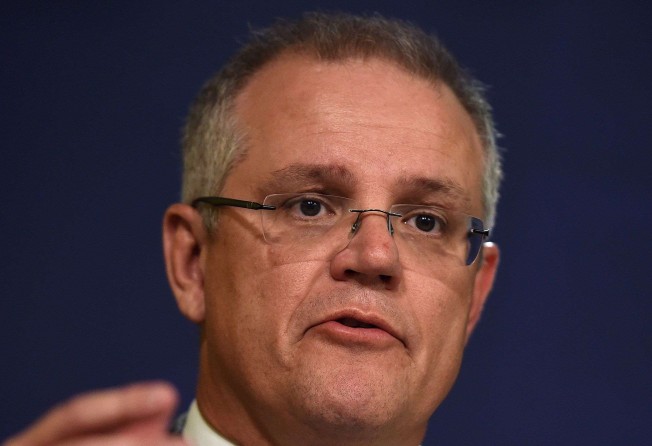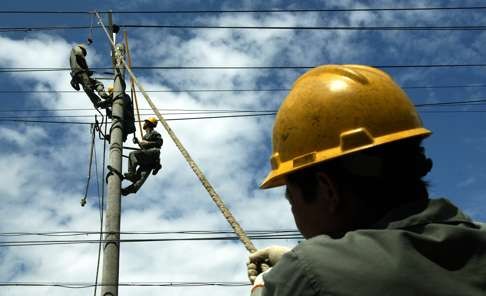Cheung Kong plays down its roots, after being blocked initially from bidding for Australian electricity firm
Li Ka-shing’s infrastructure arm underlines 90pc of its profit generated outside of HK and mainland China, and that it is ‘incorporated in Bermuda and not in Hong Kong’

Li Ka-shing’s Cheung Kong Infrastructure appears to have distanced itself from its Hong Kong roots, after the Australian government made a preliminary decision to reject bids for its Ausgrid electricity network from Hong Kong and mainland China on national security concerns.
It is the second time in two weeks that Chinese firms have faced the prospect of major setbacks in their overseas expansion ambition, with some analysts noting China’s rise in global influence and growing assertiveness have aroused political sensitivity abroad, where major asset investments by Chinese firms is involved.
Britain’s new government under Prime Minister Theresa May late last month made a surprise decision to put its final decision on the Hinkley Point nuclear plant on hold until autumn, saying it needed more time to review the project.
Chinese firms led by state-owned China General Nuclear Power, could together invest up to 33.5 per cent in the plant to be build in southwest England, under a preliminary agreement inked last October.
Australia’s Treasurer Scott Morrison told a press conference in Brisbane on Thursday it would be contrary to national security to allow the sale of a 50.4 per cent stake in Ausgrid, which supplies electricity to Sydney and neighbouring areas, to proceed in its current form.
He said the bidders, which he didn’t name, have been given a week to respond.
“I’ve informed the Ausgrid bidders of my preliminary view that their foreign investment proposals are contrary to the national interest,” Morrison said.
“That will require a final decision to be made once I have received those responses.”
Li’s CKI and State Grid made competing binding bids for Ausgrid last month, people familiar with the matter said.
State Grid has not responded to a request for comments.
In its response to the security concerns Down Under, CKI appeared to play down its Hong Kong roots as well as its business exposure to the city and mainland China.
“We believe the Australian Government must have reasons beyond the obvious which led them to make today’s announcement. The issue is unrelated to CKI,” it said in a statement on Thursday.
The company’s investments in Australia is “significantly more than that of Hong Kong and mainland China, and over 90 per cent of our profit contributions are generated outside of Hong Kong and mainland China,” it added.
“Incidentally, CKI is incorporated in Bermuda and not in Hong Kong.”
Hu Xinmin, a senior manager at electricity industry consultancy The Lantau Group, said if CKI and State Grid are eventually blocked from bidding for Ausgrid, it would be a major setback for both their bid are backed by strong financial muscle and established track records in investing in power grid assets in Australia.
“It would be a big pity, as Chinese firms have the excess cash to deploy and the human resources to develop business overseas, but they have unfortunately been caught by the political considerations,” he told the Post, adding Beijing’s increased meddling in Hong Kong’s affairs could have given the excuse for Australian politicians to oppose CKI’s bid.
UBS head of Asian utilities research Simon Powell said if CKI fails in its bid, its power and gas utility unit Power Assets would face renewed pressure to pay a special dividend given its huge cash pile.
It could also re-initiate a merger with CKI previously rejected by shareholders, to allow Power Assets’ idle cash to be invested in other infrastructure projects besides power and gas utilities.

If State Grid becomes a major shareholder of Ausgrid, it could gain access to information about the location of key infrastructure in Australia, which could be used against it if military confrontation arises, he noted.
“Ausgrid’s footprint includes critical power and communication services provided to businesses and government,” Morrison told reporters.
“National security concerns are not country-specific and relate to the transaction structure and the nature of the assets.”
The Telegraph newspaper in Britain quoted former business secretary Vince Cable as saying May has long had security concerns over China’s involvement at Hinkley Point
The Ausgrid move is the latest sign that protectionism is on the rise in Australia, where Morrison earlier this year blocked the sale of the nation’s largest cattle rancher to a Chinese-led group, saying it could be against the national interest.
If government-owned State Grid’s bid is ultimately blocked, Australia risks straining ties with its most important trading partner.
The prospects for Chinese suitors haven’t improved since the July 2 election saw several protectionist independent or minor party lawmakers elected to the upper house Senate.
The National Party, the junior partner in Prime Minister Malcolm Turnbull’s coalition, which has been a vocal critic of investment by Chinese state-owned companies, also has a bigger voice in the new government.
“There’s a lot of politics mixed up with this decision,” said Paul Williams, a political analyst at Griffith University.
“The government is struggling to engage with the electorate and is looking to re-establish some political capital. A bit of economic nationalism never goes astray.’’